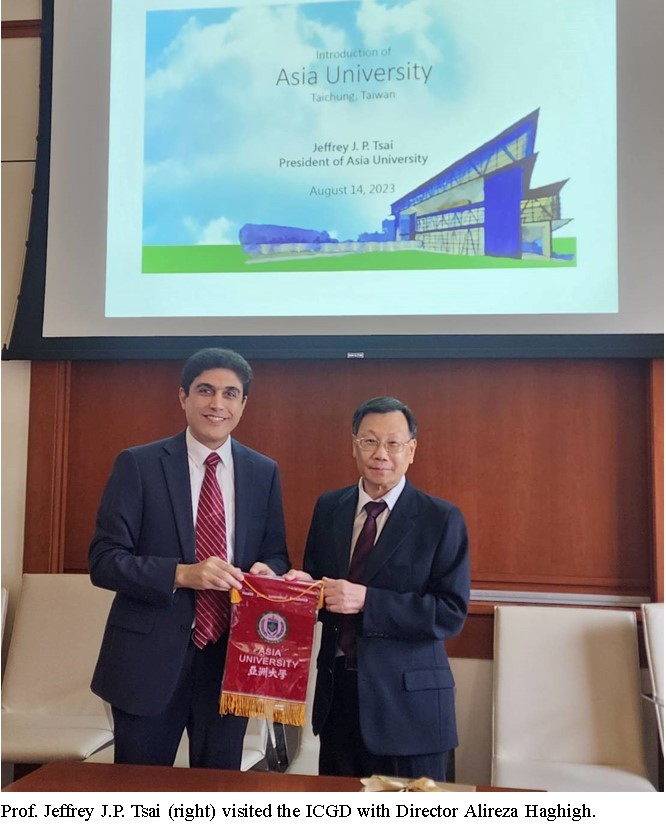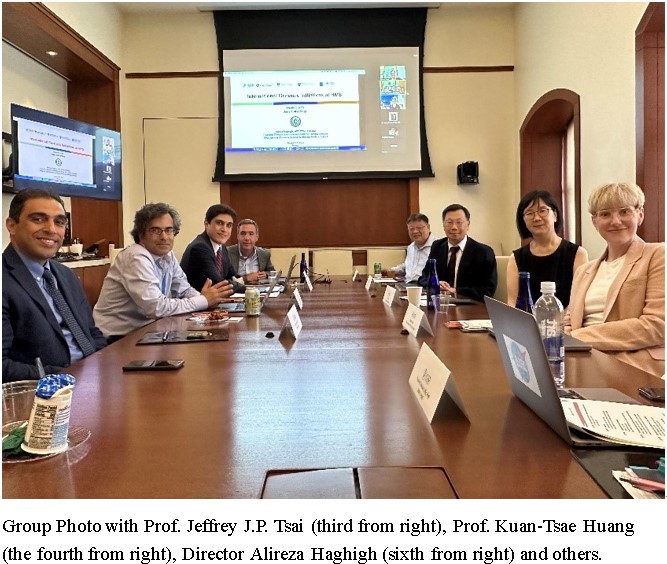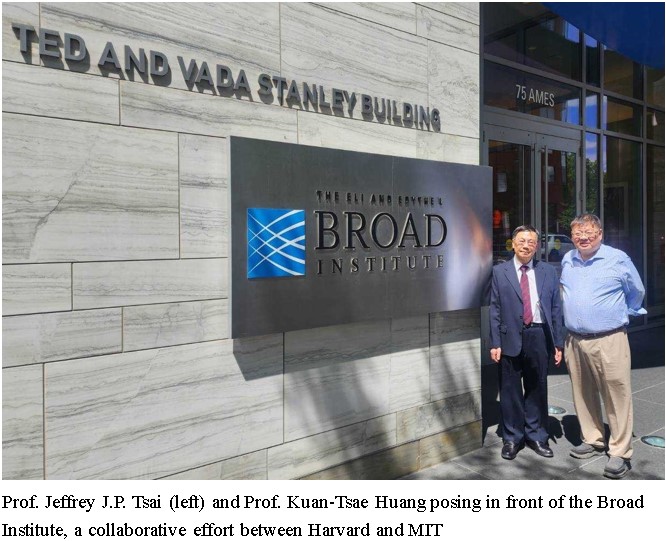 Prof. Jeffrey J.P. Tsai, President of Asia University (AU), Taiwan, and Prof. Kuan-Tsae Huang, Chair Professor of the Department of Computer Science and Information Engineering, visited the International Center for Genetic Disease (ICGD) at Harvard Medical School in August. They had discussions with Professor Alireza Haghighi, the founding director of the Center, and the research team. The two parties are collaborating on various clinical research initiatives, including disease gene diagnosis and screening analysis, gene therapy, medical genetics tourism, and population genetic screening programs. They are also working together to offer international clinical genomics medicine, molecular genomics medicine, and bioinformatics courses, fostering a more diverse partnership and breakthroughs for biomedical informatics and genetics research in the future.
Prof. Jeffrey J.P. Tsai, President of Asia University (AU), Taiwan, and Prof. Kuan-Tsae Huang, Chair Professor of the Department of Computer Science and Information Engineering, visited the International Center for Genetic Disease (ICGD) at Harvard Medical School in August. They had discussions with Professor Alireza Haghighi, the founding director of the Center, and the research team. The two parties are collaborating on various clinical research initiatives, including disease gene diagnosis and screening analysis, gene therapy, medical genetics tourism, and population genetic screening programs. They are also working together to offer international clinical genomics medicine, molecular genomics medicine, and bioinformatics courses, fostering a more diverse partnership and breakthroughs for biomedical informatics and genetics research in the future.Prof, Jeffrey J.P. Tsai and his delegation visited Harvard University's ICGD for a discussion with Prof. Alireza Haghighi and others. During the meeting, they focused on topics such as Harvard Medical School's international genetics initiatives, data science, genetics of complex diseases, and the application of artificial intelligence in genetic medicine. Attendees included:
- Dr. Anthony Philippakis, Chief Data Officer at the Broad Institute, a premier genetic and biomedical research institution jointly established by Harvard University and the Massachusetts Institute of Technology (MIT).
- Professor Soumya Raychaudhuri from the Department of Bioinformatics and Medical Informatics at Harvard Medical School (HMS).
- Professor Manolis Kellis from the Department of Computer Science at the Massachusetts Institute of Technology (MIT).
- Amir Haghighi, Director of Research at MIT Center.
- Danielle Coifani, Senior Director of Data Strategy at MIT.
Prof. Jeffrey J.P. Tsai announced that AU has established the Center for Precision Health Research, AI Research Center, and Big Data Research Center. The University has undertaken several multi-year integrated projects funded by the National Science and Technology Council, including the “Intelligent Cardiothoracic Ratio (iCTR) Assessment System,” which has even received regulatory approval for Software as a Medical Device (SaMD) from both U.S. and Taiwan health authorities. Additionally, AU has received 16 National Innovation Awards over the past 6 years, and it has actively engaged in industry-academia collaborations, including technology transfer partnerships with EverFortune.AI.
 Prof. Jeffrey J.P. Tsai pointed out that within the “China Medical University-Asia University System (CMU-AU System)”, consisting of both Asia University and China Medical University, AU plans to establish the Asia University-affiliated Fengyuan Hospital and private Fengyuan long-term care institutions in the Fengyuan area of Taichung City in the future. AU hopes to collaborate with Harvard University through practice and research to achieve greater breakthroughs and advancements in the fields of biomedical informatics and genetic research in the future.
Prof. Jeffrey J.P. Tsai pointed out that within the “China Medical University-Asia University System (CMU-AU System)”, consisting of both Asia University and China Medical University, AU plans to establish the Asia University-affiliated Fengyuan Hospital and private Fengyuan long-term care institutions in the Fengyuan area of Taichung City in the future. AU hopes to collaborate with Harvard University through practice and research to achieve greater breakthroughs and advancements in the fields of biomedical informatics and genetic research in the future.Prof. Alireza Haghighi explained that the ICGD brings together clinical doctors and scientists from different parts of the world with the aim of uncovering the genetic origins of diseases and translating these discoveries into better diagnostic, therapeutic, and preventive strategies. The Center conducts international collaborative research in genomics of human health and diseases, with the goal of advancing the implementation of genetic medicine on a global scale.
The two parties reached an agreement to collaborate on clinical research in areas such as disease gene exploration, diagnosis, and screening analysis; translational and clinical implementations such as population genetic screening programs and the provision of services for rare and undiagnosed diseases in Taiwan. Additionally, ICGD will offer international clinical genomic medicine courses, molecular genomic medicine and bioinformatics courses, as well as technology transfer related to bioinformatics tools and processes. This collaboration aims to facilitate more diverse and in-depth exchanges in these fields.


